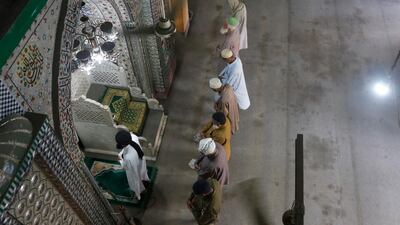Pakistan has lifted bans on congregational prayers at mosques ahead of Ramadan, prompting alarm from some health experts who are worried about the spread of Covid-19.
The government bowed to calls from influential clerics and religious parties to relax the country’s pandemic precautions, which include a limit of three to five people visiting mosques at any time.
The decision, after meetings between President Arif Alvi and religious leaders, came less than a week before the start of the Ramadan, when attendance at mosques increases.
Government officials and religious leaders agreed to allow communal prayers if mosques signed up to 20 precautions to stop the coronavirus sweeping through their congregations.
The decision was described as a dangerous precedent at odds with many other Muslim nations where mosques were closed.
Dr Mishal Khan, an associate professor at the London School of Hygiene and Tropical Medicine, said she was “very concerned” about the decision.
“As a policy analyst I'm well aware that religious leaders are powerful and the government would have had little choice," Dr Khan said.
"But giving the impression to the public that congregations can be safe is dangerous.”
Pakistan's case figures have so far defied predictions of a heavy toll from the virus.
By Sunday, a total of 7,993 cases and 159 deaths had been recorded among the 220 million population.
But a lack of testing was feared to be hiding a more widespread infection, and Prime Minister Imran Khan on Saturday warned that case numbers were expected to rise towards the end of April.
Pakistan's provinces have been locked down for more than three weeks, with people largely confined to their homes unless on essential business.
But several influential religious leaders in Pakistan had baulked at the restrictions on mosques and the limit on attendance numbers was widely flouted.
In the port city of Karachi, police officers were assaulted this month while trying to impose the measures.
Last week, senior clerics said they would defy the limits and impose their own distancing precautions for worshippers.
In the weekend talks, Mr Alvi and the government appeared to bow to the main demands of religious leaders.
The list of 20 precautions includes removing mosque carpets, enforcing a 2-metre gap between worshippers and regularly disinfecting premises.
Children and those over 50 will have to pray at home.
If the government suspects the rules are being flouted, the restrictions will be revisited, Mr Alvi said.
Mosques are closed in the UAE and Saudi Arabia, with the Saudis saying they will remain shut for the taraweeh prayers performed every night during Ramadan.
Abdul Latif Al Sheikh, the Saudi Minister of Islamic Affairs, last week said prayers should be performed at home if the Covid-19 pandemic persisted.
"Suspension of the five daily prayers at mosques is more important than the suspension of taraweeh prayers," Mr Al Sheikh told Al Riyadh newspaper.
"We ask the Almighty Allah to accept taraweeh prayers, whether we perform them at mosques or at our homes."

